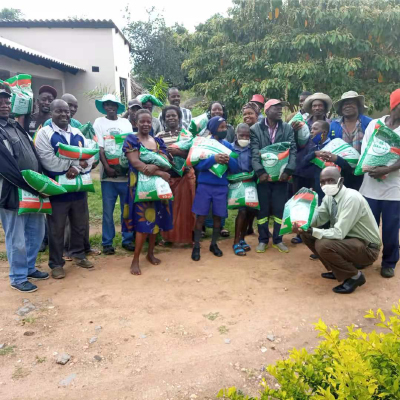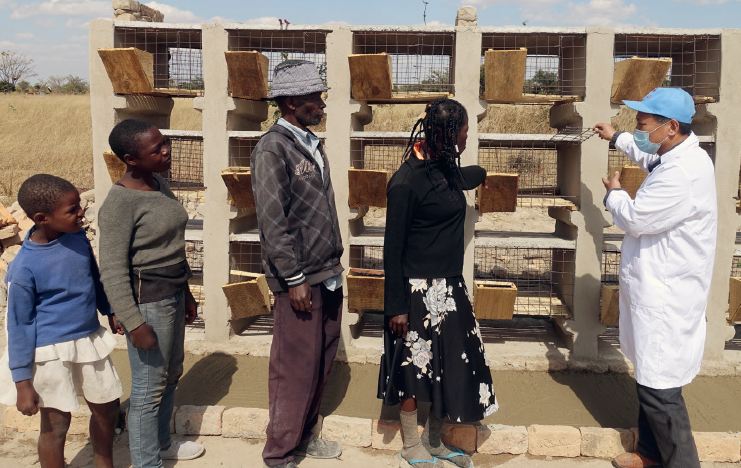|
||||||||||
| Home Nation World Business Opinion Lifestyle ChinAfrica Multimedia Columnists Documents Special Reports |
|
||||||||||
| Home Nation World Business Opinion Lifestyle ChinAfrica Multimedia Columnists Documents Special Reports |
| ChinAfrica |
| China, Zimbabwe cooperate on enhancing poverty alleviation capacity and methods |
| Isaac, 45, is the backbone of the whole family. His wife Ndakaitei Matare suffers from poliomyelitis since childhood and is unable to stand |
| By Xia Yuanyuan VOL. 13 SEPTEMBER 2021 ·2021-09-08 |

Two years ago, when Chinese experts with the third China-Zimbabwe Agricultural Cooperation Program visited the home of Isaac Matare, a farmer in the village of Chirimanyemba in the Zvimba Region of Mashonaland West Province of Zimbabwe, what they saw was a desperately poor family.
Isaac, 45, is the backbone of the whole family. His wife Ndakaitei Matare suffers from poliomyelitis since childhood and is unable to stand. Their two children dropped out of school due to lack of money.
Although the family had five hectares of land, they could only harvest 200 to 300 kg of corn per year due to lack of fertilizer and water. Living in a dilapidated, damaged house, the family could barely afford two meals a day.
But the situation of Isaac was not unique in the area. Backward agricultural production and fragile infrastructure had severely restricted local development, leaving families in desperate conditions.
"After seeing this situation, we decided to apply China's experience in shaking off poverty to this area," said Zhang Shihong, head of the Chinese expert team.
In November 2019, under the direction of the Center of International Cooperation Service of the Chinese Ministry of Agriculture and Rural Affairs and the Office of Economic and Commercial Affairs of the Chinese Embassy in Zimbabwe, and with the strong support of the local government, the expert team selected Chirimanyemba Village for establishing the demonstration base of the China-Zimbabwe agricultural cooperation project. Isaac was fortunate to be one of the households to receive assistance.
After conducting surveys and in-depth discussions, the team suggested Isaac's family combine corn planting and raising rabbits as a means of enhancing their income and shaking off poverty. The team provided him with corn seeds, fertilizers and pesticides, helped him repair 18 new rabbit pens, and provided 12 breeding rabbits. Later, he was also provided technical guidance and training. With the help of the team, Isaac became more optimistic about the family's future.
In June 2021, when the expert team came to Isaac's home again, they were surprised to see the dramatic change that had taken place. In two years, the family harvested 3.5 tons of corn, which solved the problem of food shortage. Besides, they raised 108 rabbits, of which 25 were breeding rabbits. The income from selling rabbits not only helped them to renovate the house, but also enabled their two children to go back to school.
To express his gratitude to the expert group, Isaac painted the "CHINA AID" logo on his wall.
In the past two years, the expert group composed of 10 Chinese agricultural experts has built the Zvimba Poultry Hatchery Center, a drinking water project, a training center and other public welfare projects in Chirimanyenmbas Village, benefiting more than 4,000 people in the village and surrounding areas, and helping the villagers lift themselves out of poverty.
In July 2021, the expert group was awarded the "Honorable Certificate" by the Ministry of Lands, Agriculture, Fisheries, Water and Rural Resettlement of Zimbabwe in recognition of their special contribution to agricultural development of the country.

Exploring the right way
Zimbabwe has 4.72 million hectares of arable land, and small farmers account for more than 80 percent of the agricultural population. Although land and labor resources are abundant, the country is faced with the problems of poor infrastructure, weak drought resistance, backward production methods and lack of agricultural inputs, resulting in less than 50 percent utilization of land.
In the 2018-2019 agricultural production season, Zimbabwe faced a food shortage of 902,000 tons due to severe drought, and 5.5 million people faced severe famine.
"To improve the production and living standards of farmers, we must first solve the problem of food shortage," Zhang told ChinAfrica.
The expert group found that though Chirimanyenmbas Village had abundant land resources, it had no access to electricity, and farmers mainly planted corn and raised poultry. The average annual grain output was 95 kg per capita, and the average annual household income was about $500.
In the first phase of the project, 26 households were selected as demonstration households, including 14 demonstration households for corn plantation and chicken breeding and 12 demonstration households for corn plantation and rabbit breeding.
After two years of hard work, the agricultural production level of Chirimanyenmbas Village has been greatly improved. The corn yield of farmers in this village has more than doubled, and the total annual grain output has reached nearly 500 tons.
In addition, the income of farmers has also greatly increased. Through the development of native-chicken breeding and rabbit breeding, the average household income of the villagers has grown to $1,150, an increase of more than 40 percent.
Sustainable development
"Learning from China's poverty reduction experience, we did not simply bring money and projects here like blood transfusion, but have been carrying out a more effective and sustainable 'hematopoietic poverty alleviation' in the villages covered by the project," Zhang told ChinAfrica.
The group has been introducing the concepts of self-organization, self-supervision, self-management and self-development to local villagers, establishing village-level project implementation and management, and forming the prototype of rural cooperatives and collective economy, thus to help realize sustainable development.
In terms of plantation, the group has facilitated agreements between local enterprises and farmers under which the enterprise provides seeds, fertilizers and pesticides, and the farmers are responsible for planting and delivering orders. When enterprises purchase agricultural products, they deduct the costs of seeds, fertilizers and pesticides, and the remaining income goes to the farmers, which can greatly boost farmers' enthusiasm for production and expand the planting area.
As for poultry, farmers can choose to raise rabbits, chickens and bees. The development mode takes the form of circular assistance. After successfully raising breeding rabbits, chickens and bees given by the Chinese expert group in the first year, the aided farmers need to donate the same quantity and quality of breeding rabbits, chickens and bees to the next farmer in the second year for free, so that it will be passed on to ensure the sustainable development of local poultry industry.
Capacity building
"We pay particular attention to improving the ability of villagers, and the overall capability of the village officials to achieve sustainable development," Zhang told ChinAfrica.
The expert group believes that the key to poverty alleviation lies in the psychological transformation of farmers. Only by mobilizing local farmers to actively participate and change their thinking from being dependent to being independent can we fully eliminate poverty.
During the two years, the expert group trained more than 3,000 local professional farmers, including 500 young farmers in five agricultural colleges and 35 farmers in the demonstration village.
At present, the demonstration village project has reached the stage of smooth operation. The expert team believes that after summing up the experience, it can be promoted in other villages in the Zvimba region and even the whole country, so as to achieve sustainable development of agriculture in Zimbabwe.
"It is really not easy to build a China-Zimbabwe agricultural cooperation demonstration village. The expert group has overcome a lot of challenges including the outbreak of the COVID-19 pandemic and local security issues," Zhang said.
The expert group of the fourth China-Zimbabwe Agricultural Cooperation Program will be assigned later this year and they will take over the baton and continue to lead Zimbabwean farmers to improve their independent production capacity and agricultural production efficiency.
(Printed Edition Title: Ensuring a Rich Harvest)
Comments to xyy@chinafrica.cn
| About Us | Contact Us | Advertise with Us | Subscribe |
| Copyright Beijing Review All rights reserved 京ICP备08005356号-5 京公网安备110102005860号 |